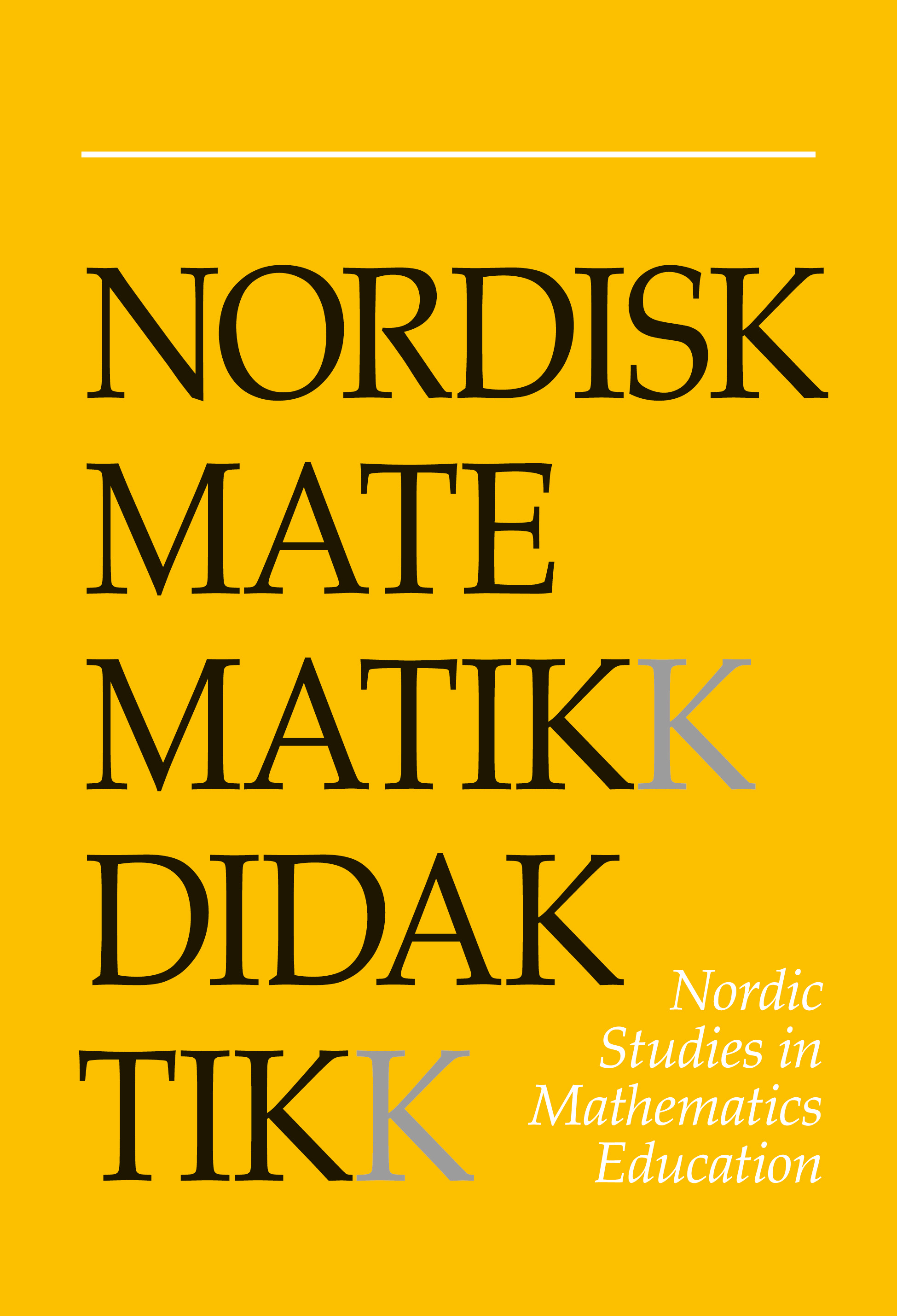Convergences and influences of discourses in an online professional development course for mathematics teachers
DOI:
https://doi.org/10.7146/nomad.v22i1.148760Abstract
Despite the ever-increasing number of online professional development (OPD) courses, few studies have examined online education for mathematics teachers. This article reports on a case study of discourses in an OPD course for mathematics teachers concerning the convergence and influence of discourses in course seminar discussions and in mathematics teaching in school when course participants are given the task of translating their insights into actual teaching, with a focus on the participants’ discussions of their own and one another’s video-recorded lessons. The analy- sis shows that there is a convergence of discourses in the seminars and in the school context related to a focus on concepts and everyday life connections. However, the study also suggests that there is a risk of students remaining outside in an ”everyday discourse”, in which knowledge of mathematics might be useful, but mathematics is discussed in imprecise and simplified terms.
References
Barwell, R. (2013). The academic and the everyday in mathematicians' talk: the case of the hyper-bagel. Language and Education, 27 (3), 207-222. https://doi.org/10.1080/09500782.2012.696656
Ben-Yehuda, M., Lavy, I., Linchevski, L. & Sfard, A. (2005). Doing wrong with words: what bars students' access to arithmetical discourses. Journal of Research in Mathematics Education, 36 (3), 176-247.
Bernstein, B. (2000). Pedagogy, symbolic control and identity: theory, research, critique. Lanham: Rowman & Littlefield Publishers.
Borba, M. C. & Llinares, S. (2012). Online mathematics teacher education: overview of an emergent field of research. ZDM, 44 (6), 697-704. https://doi.org/10.1007/s11858-012-0457-3
Borko, H. (2004). Professional development and teacher learning: mapping the terrain. Educational Researcher, 33 (8), 3-15. https://doi.org/10.3102/0013189X033008003
Dash, S., Kramer, R. M. de, O'Dwyer, L. M., Masters, J. & Russell, M. (2012). Impact of online professional development on teacher quality and student achievement in fifth grade mathematics. Journal of Research on Technology in Education, 45 (1), 1-26. https://doi.org/10.1080/15391523.2012.10782595
Duval, R. (2006). A cognitive analysis of problems of comprehension in a learning of mathematics. Educational Studies in Mathematics, 61 (1/2), 103-131. https://doi.org/10.1007/s10649-006-0400-z
Erixon, E.-L. (2016). Learning activities and discourses in mathematics teachers' synchronous oral communication online. Research in Mathematics Education, 18 (3), 267-282. https://doi.org/10.1080/14794802.2016.1190667
Erixon, E.-L. & Wahlström, N. (2016). In-service training programmes for mathematics teachers nested in transnational policy discourses. European Journal of Teacher Education, 39 (1), 94-109. https://doi.org/10.1080/02619768.2015.1101062
Evans, J., Morgan, C. & Tsatsaroni, A. (2006). Discursive positioning and emotion in school mathematics practices. Educational Studies in Mathematics, 63 (2), 209-226. https://doi.org/10.1007/s10649-006-9029-1
Fairclough, N. (2010). Critical discourse analysis: the critical study of language. Harlow: Longman. https://doi.org/10.4135/9781446289068.n17
Gee, J. P. (1989). Literacy, discourse, and linguistics: introduction. Journal of Education, 171 (1), 5-17. https://doi.org/10.1177/002205748917100101
Gee, J. P. (2014). An introduction to discourse analysis: theory and method. New York: Routledge. https://doi.org/10.4324/9781315819679
Goos, M. & Geiger, V. (2012). Connecting social perspectives on mathematics teacher education in online environments. ZDM, 44 (6), 705-715. https://doi.org/10.1007/s11858-012-0441-y
Hodges, T. E. & Cady, J. (2013). Blended-format professional development and the emergence of communities of practice. Mathematics Education Research Journal, 25 (2), 299-316. https://doi.org/10.1007/s13394-012-0065-0
Högberg, S. (2015). Om lärarskapets moraliska dimension: ett perspektiv och en studie av lärarstuderandes nätbaserade seminariesamtal [On the moral dimension of teaching: a perspective and a study of student teachers' discussions in net-based seminars] (Ph.D. dissertation). Department of Humanities, Education and Social Sciences, Örebro University.
Imm, K. & Stylianou, D. A. (2012). Talking mathematically: an analysis of discourse communities. The Journal of Mathematical Behavior, 31 (1), 130-148. https://doi.org/10.1016/j.jmathb.2011.10.001
McBrien, J. L., Jones, P. & Cheng, R. (2009). Virtual spaces. Employing a synchronous online classroom to facilitate student engagement in online learning. The International Review of Research in Open and Distributed Learning, 10 (3), 1-17. https://doi.org/10.19173/irrodl.v10i3.605
Moschkovich, J. (2002). A situated and sociocultural perspective on bilingual mathematics learners. Mathematical Thinking and Learning, 4 (2-3), 189-212. https://doi.org/10.1207/S15327833MTL04023_5
Niss, M. (2007). Reflections on the state of and trends in research on mathematics teaching and learning. In F. K. Lester (Ed.), Second handbook of research on mathematics teaching and learning (pp. 1293-1312). Charlotte: Information Age.
Radford, L., Bardini, C. & Sabena, C. (2007). Perceiving the general: the multisemiotic dimension of students' algebraic activity. Journal for Research in Mathematics Education, 38 (5), 507-530.
Riesbeck, E. (2008). På tal om matematik. Matematiken, vardagen och den matematikdidaktiska diskursen [Speaking of mathematics. Mathematics, every-day life and school mathematics discourse] (Ph.D. dissertation). Department of Behavioural and Sciences Learning, University of Linköping.
Russell, M., Carey, R., Kleiman, G. & Venable, J. D. (2009). Face-to-face and online professional development for mathematics teachers: a comparative study. Journal of Asynchronous Learning Networks, 13 (2), 71-87. https://doi.org/10.24059/olj.v13i2.1669
Ryve, A. (2011). Discourse research in mathematics education: a critical evaluation of 108 journal articles. Journal for Research in Mathematics Education, 42 (2), 167-199. https://doi.org/10.5951/jresematheduc.42.2.0167
Sfard, A. (2000). On reform movement and the limits of mathematical discourse. Mathematical Thinking and Learning, 2 (3), 157-189. https://doi.org/10.1207/S15327833MTL0203_1
Sfard, A. (2001). There is more to discourse than meets the ears: looking at thinking as communicating to learn more about mathematical learning. Educational Studies in Mathematics, 46 (1/3), 13-57. https://doi.org/10.1023/A:1014097416157
Sfard, A. (2007). When the rules of discourse change, but nobody tells you: making sense of mathematics learning from a commognitive standpoint. The Journal of the Learning Sciences, 16 (4), 565-613. https://doi.org/10.1080/10508400701525253
Sfard, A. (2008). Thinking as communicating: human development, the growth of discourses, and mathematizing. Cambridge University Press. https://doi.org/10.1017/CBO9780511499944
Sfard A. (Ed.) (2012). Developing mathematical discourse: some insights from communicational research. International Journal of Educational Research [Special issue], 51-52. https://doi.org/10.1016/j.ijer.2011.12.013
Sfard, A. & Kieran, C. (2001). Cognition as communication: rethinking learning-by-talking through multi-faceted analysis of students' mathematical interactions. Mind, Culture, and Activity, 8 (1), 42-76. https://doi.org/10.1207/S15327884MCA0801_04
Downloads
Published
How to Cite
Issue
Section
License

This work is licensed under a Creative Commons Attribution-NonCommercial-ShareAlike 4.0 International License.



